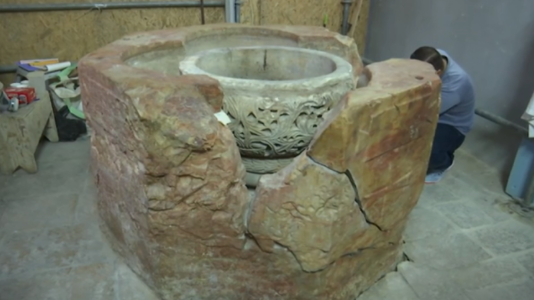Rella
"Daughter of the King"
- Joined
- Jul 30, 2023
- Messages
- 924
- Reaction score
- 363
- Points
- 63
- Location
- PA
- Faith
- Christian
- Country
- USA
- Marital status
- not-married
- Politics
- YES. Always looking right.
Part 2 of 2 (cont)
Sole Opponent - A Heretic
In the 1,500 years from the time of Christ to the Protestant Reformation, the only bonafide opponent to infant Baptism was Tertullian (160 - 215), bishop of Carthage, Africa. His superficial objection was to the unfair responsibility laid on godparents when the children of pagans joined the church. However, his real opposition was more fundamental. It was his view that sinfulness begins at the "puberty, of the soul," that is "about the fourteenth year of life" and "it drives man out of the paradise of innocence" (De Anima 38:2). This rules out the belief in original sin.
Tertullian’s stance, together with other unorthodox views, led him to embrace Montanism in 207. Montanism denied the total corruption and sinfulness of human nature. With its emphasis upon the supernatural gifts of the Holy Spirit, it was the precursor to the modern Charismatic Movement.
Except for Tertullian’s heretical views, marking his departure from mainstream Christianity, the only other opposition to infant Baptism came during a brief period in the middle of the fourth century. The issue was the fear of post-Baptismal sin. This heretical view also denied Baptism to adults until their death-bed. It was not in reality a denial of infant baptism in and of itself. In fact, the heresy encouraged the Baptism of infants when death seemed imminent, as it also did for adults.
The Anabaptists
Not until the 1520s did the Christian Church experience opposition specifically to infant Baptism. Under the influence of Thomas Muenzer and other fanatics who opposed both civil and religious authority, original sin and human concupiscence was denied until the "age of accountability." Although there is no basis in Scripture for this position, a considerable number of Swiss, German and Dutch embraced the Anabaptist cause. So offensive was this position that Roman Catholics, Lutherans and Reformed alike voiced strong warning and renunciation. It was considered a shameless affront to what had been practiced in each generation since Christ’s command in the Great Commission (Matthew 28: 18-20) to baptize all nations irrespective of age.
Sole Opponent - A Heretic
In the 1,500 years from the time of Christ to the Protestant Reformation, the only bonafide opponent to infant Baptism was Tertullian (160 - 215), bishop of Carthage, Africa. His superficial objection was to the unfair responsibility laid on godparents when the children of pagans joined the church. However, his real opposition was more fundamental. It was his view that sinfulness begins at the "puberty, of the soul," that is "about the fourteenth year of life" and "it drives man out of the paradise of innocence" (De Anima 38:2). This rules out the belief in original sin.
Tertullian’s stance, together with other unorthodox views, led him to embrace Montanism in 207. Montanism denied the total corruption and sinfulness of human nature. With its emphasis upon the supernatural gifts of the Holy Spirit, it was the precursor to the modern Charismatic Movement.
Except for Tertullian’s heretical views, marking his departure from mainstream Christianity, the only other opposition to infant Baptism came during a brief period in the middle of the fourth century. The issue was the fear of post-Baptismal sin. This heretical view also denied Baptism to adults until their death-bed. It was not in reality a denial of infant baptism in and of itself. In fact, the heresy encouraged the Baptism of infants when death seemed imminent, as it also did for adults.
The Anabaptists
Not until the 1520s did the Christian Church experience opposition specifically to infant Baptism. Under the influence of Thomas Muenzer and other fanatics who opposed both civil and religious authority, original sin and human concupiscence was denied until the "age of accountability." Although there is no basis in Scripture for this position, a considerable number of Swiss, German and Dutch embraced the Anabaptist cause. So offensive was this position that Roman Catholics, Lutherans and Reformed alike voiced strong warning and renunciation. It was considered a shameless affront to what had been practiced in each generation since Christ’s command in the Great Commission (Matthew 28: 18-20) to baptize all nations irrespective of age.
| Regeneration for All Ages continued in part 2 Who would be so blind as to limit this expression of God’s grace and mercy to adolescents and adults and to exclude infants and children?. If John the Baptizer could be filled with the Holy Spirit from his mother’s womb (Luke 1: 15), and if Jesus could say (Matt. 18: 6), "Whoever offends one of these little ones (Gk."toddlers") who believe in Me, it were better that he were drowned in the depth of the sea," and if the Apostle Peter could say on the Day of Pentecost (Acts 2: 39), "The promise is unto you and to your children," what mere mortal dare declare so gracious an invitation to be invalid for infants, or forbid the continuance of the Baptism of infants for coming generations? If the entire families and households of the Philippian jailer, Lydia, Cornelius, Crispus and Stephanas of the New Testament were incorporated into the household of faith through Baptism, surely that testimony is immutable and established for all time. Yes, we baptize babies. Unmistakably Scriptural proof substantiates that doctrine. Christian history, unbroken and uninterrupted. reflects such practice in each generation. Conscientious Christians do not delay but hasten with their children to Baptism that they may received the gift of salvation and regeneration and gratefully embrace the Apostle’s affirmation extended to those of all age groups: "For as many of you as have been baptized have put on Christ" (Galatians 3: 27). Dennis Kastens |


